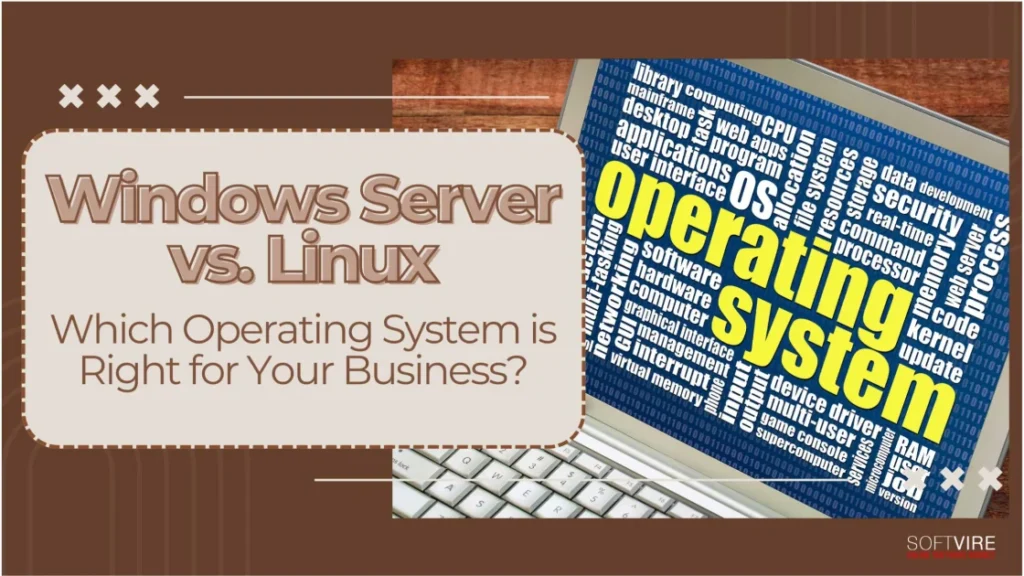Making the right choice when selecting your website’s server operating system (OS) is an important decision that may affect the entire user experience, performance, and security.
Linux and Windows stand out as two important possibilities in server operating systems. Understanding these differences is essential to make an informed choice that aligns with your business needs.
In this blog, we will explain the key differences between Linux and Windows server OS, making it easier to decide which is the best fit for your website.
Linux Overview
Any server that uses the free and open-source Linux OS is known as a Linux server. The combination of its inexpensive price, robust community support, and open-source code makes it a popular option.
Ubuntu, CentOS, Debian, and many other distributions are based on the Linux kernel. Each offers reliable, secure, and adaptable operating systems. Because of these characteristics, Linux servers are often used for hosting online services, managing databases, and administering networks and systems.
Windows Overview
Windows Server is a commercial server solution built by Microsoft and powered by the Windows operating system. Its robustness, reliability, and minimal maintenance requirements make it an ideal choice for beginners.
Microsoft Windows is the most frequently used computer operating system worldwide, with 68.15% of the desktop, tablet, and console operating system markets in February 2024.
Microsoft servers are popular among newcomers due to their intuitive design. Every iteration offers an all-new, highly polished graphical user interface (GUI) desktop experience. This solution also includes the possibility of fixing technical difficulties via system recovery and quick, optional automated system upgrades.
Therefore, this pre-built feature is excellent for administrators with little time or expertise to devote to upkeep.
Windows Server is the optimal solution for using Microsoft SQL, Microsoft Access, or any other Microsoft program because it effortlessly includes Windows programs.
One of the widely used Windows servers nowadays, mainly by remote workers, is Microsoft Server 2008 Enterprise. It is a large-scale 64-bit operating system upgrade to Microsoft’s famous 2003 version.
Windows Server vs. Linux: The Comparison
Several considerations should be taken into account while choosing between Linux and Windows Server:
Cost:
The licensing costs of Windows Server may add up quickly, particularly for businesses with many servers or users. Linux, on the other hand, is often accessible for free or at a reduced cost, which makes it a good choice for businesses that are watching their budgets.
Ease of Use:
Businesses using Microsoft software may find it more straightforward to use Windows Server’s graphical user interface and interact with other Microsoft products. Linux allows more customization but may require more technical know-how due to its command-line interface and variety of distributions.
Security:
Linux and Windows Server have robust security measures, but the two approach security in distinct ways. Windows Server’s security features and upgrades are second to none, whereas Linux depends on its security model and the community’s help. Ultimately, it might come down to your own tastes and security requirements.
Stability and Performance:
The reliability and speed of Linux have made it a popular choice, particularly in demanding settings. Despite its strong performance, getting the same outcomes with Windows Server may take more resources. Linux might be a superior option if stability and performance are your primary concerns.
Software and Application Compatibility:
Think about the programs and hardware that your company uses daily. Windows Server might be better if your company relies on Microsoft-exclusive software. When it comes to open-source or cross-platform applications, Linux might be the better choice.
Support and Maintenance:
Microsoft provides regular updates, devoted customer assistance, and commercial support for Windows Server. Enterprise Linux distributions come with both commercial and community support. Before deciding, consider your assistance needs and the resources at your disposal.
Final Thoughts
Choosing the best operating system for business involves evaluating your needs, budget, and technical expertise.
A Linux server might be ideal for your business if you’re looking for a cheap, flexible, easily-modifiable, scalable, and dependable server. On the other hand, a Windows server might be the way to go if you’re after a server that’s a little more robust, feature-oriented, and supported by experts; it also comes with the ability to connect Microsoft products and be managed remotely.
However, the right choice will depend on your business’s unique requirements and priorities. By carefully considering cost, ease of use, security, performance, software compatibility, and support, you can make an informed decision that aligns with your organization’s goals and ensures a successful IT infrastructure.



